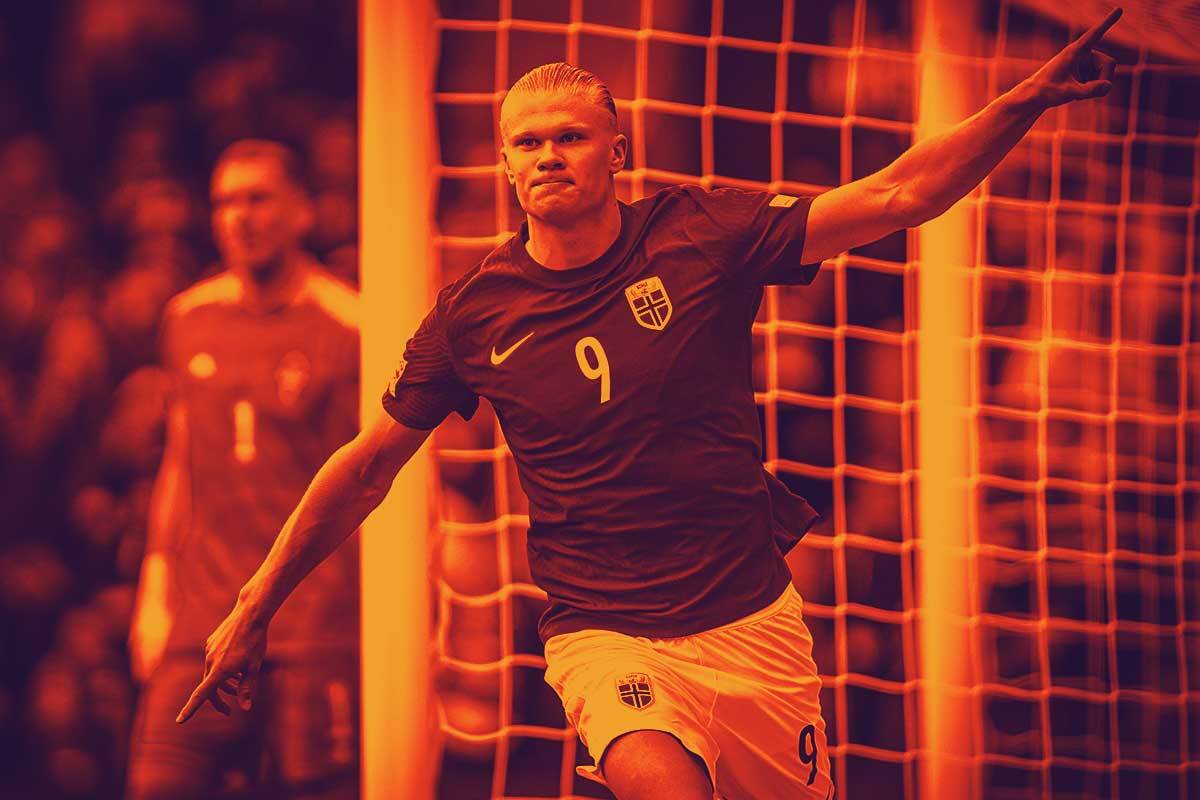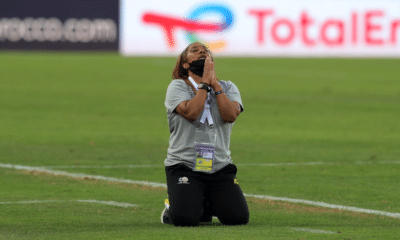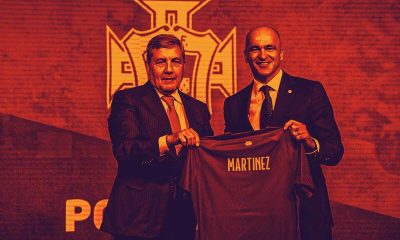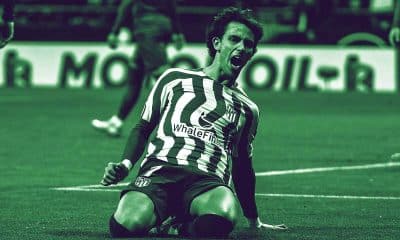
The 2022 FIFA World Cup is already underway, with Qatar’s opening match against Ecuador kicking off the first-ever tournament to be held in the middle of the season, the first to be played in Asia, and the final one to include 32 teams with the 2026 edition set to grow to 48. There are plenty of major absences with the likes of Algeria, Egypt and Nigeria falling in the new two-legged CAF qualifiers, whilst Colombia, Chile, Peru and more missed out on a spot in CONMEBOL’s qualifiers and Italy, Sweden, Ukraine, Turkey and various other European sides unable to secure qualification. Today on Bet Central, we’ll be taking a look at the 11 best players who will be missing out on the action in Qatar due to their team’s failure to qualify for the World Cup, and we’ll be limiting it to one player per nation.
Jan Oblak
It has been a dreadful run of form for Atlético Madrid, who closed out October with a 1-1 home draw against Rayo Vallecano, a 2-1 away win against Real Betis, a 2-2 draw at home against Bayer Leverkusen and a 3-2 loss to Cádiz before starting November with a trip to the Estádio do Dragão, a game that was made effectively meaningless as a result of their draw to Leverkusen which saw Yannick Carrasco miss a penalty in the final second and ensure Porto’s qualification for the knockout round with one match remaining. Porto would take the lead within five minutes via Mehdi Taremi and double it in the 24th minute, and they could have enjoyed a goal fest had it not been for the heroics of Atleti captain Jan Oblak in goal, making six saves and keeping Atleti in the game with Iván Marcano scoring an own goal in the final minute as the Dragons took a 2-1 victory at home. Despite losing their first two matches, Sérgio Conceição’s side would finish first in their group, and despite winning their first match against Porto with a last-second winner from Antoine Griezmann in a 2-1 victory in Madrid, Atlético Madrid finished bottom of their Champions League group for the first time under Diego Simeone, and they find themselves 13 points behind Barcelona, 11 behind Real Madrid, two behind Real Sociedad, level on points with Real Betis and Athletic Club, and one above Osasuna.
Apart from Nahuel Molina, who arrived from Udinese for €20 million to fill a hole at right back that had been left by Kieran Trippier’s January departure to Newcastle, and Samuel Lino, who joined from Gil Vicente for €6.5 million before joining Valencia on loan, Atleti’s only summer signings were the free transfer of Axel Witsel, who has made 21 appearances and deputised as a centre back and a defensive midfielder since arriving on a free transfer from Borussia Dortmund, and the loan arrival of Sergio Reguilón who made his first appearance for the club in a 21-minute cameo against Mallorca midweek before being acquitted to the hospital with an acute digestive problem. Atleti’s financial shortcomings take another massive toll with the club’s failure to reach the Champions League or Europa League knockout round, and it could see a fire sale with the likes of Álvaro Morata, Yannick Carrasco, João Félix, and Rodrigo de Paul potentially being pushed for an exit, but one player that they will be desperate to keep hold of is Jan Oblak. The Slovenian goalkeeper has emerged as one of the best in his position since arriving from Benfica in 2014 and surpassed Diego Godín as the foreign player with the most appearances for Atlético Madrid with 278 in Sunday’s match against Espanyol, and with the 29-year-old penning a contract extension until 2028 in July, it seems as though he’s ready to commit his long-term future to an Atleti side that is sinking fast. Oblak wears the captain’s armband for Atleti and Slovenia, who finished fourth in their World Cup qualifying group and who have qualified for the tournament on two occasions in 2002 and 2010, displaying cat-like reflexes and an innate ability to shine in the biggest moments for both club and country, filling Thibaut Courtois’ void with ease, and solidifying himself as one of the finest goalkeepers of his era. It took Oblak 278 games to concede 200 goals; in comparison, it took Courtois 228 and Victor Valdés 221. For €16 million, Jan Oblak could go down as one of the best goalkeeping bargains in football history.
Wilfried Singo
After making it to a first-ever World Cup in 2006, the Ivory Coast secured qualification to the following two tournaments before missing out on the next two, with the departures of veteran players like Didier Drogba and Yaya Touré taking their toll on Les Elefants, who were knocked out of the AFCON at the Round of 16 on penalties to Egypt after drawing 0-0. It has been a disappointing year for the West African side, but they nevertheless have plenty of reason for optimism in the emergence of 21-year-old right-back Wilfried Singo.
A youth product of Denguélé, Singo left the Ivory Coast at the age of 18 and joined Torino in January 2019 where he initially played as a centre-back before being shifted to the right-back position over the course of the season for the Primavera side. Singo made his Torino debut in a seven-minute cameo in a 4-1 win against Debrecen on August 1, 2019, before making two more brief cameos in Torino’s unsuccessful Europa League qualifying journey, but he would nevertheless have to wait another 11 months before making his next appearance, playing 15 minutes and making his Serie A debut in a 4-2 loss to Cagliari. He dropped to the bench for the next three matches, coming off the bench in the next two, and remaining an unused substitute in the next three before making his first start for the club in the penultimate matchday of the season and scoring within 65 minutes shortly after Amadou Diawara stretched Roma’s lead to two from the spot, but Torino were unable to come up with an equalizer and fell to a 3-2 defeat, whilst Singo would miss the following match and the first two of 2020/21 due to a shoulder injury. The Ivorian came off the bench in the following three matches before starting in Torino’s 2-1 win against Genoa on November 4 and earning another start 18 days later and picking up an assist in a 4-2 loss to Inter before adding another assist in the following match, a 2-2 draw to Sampdoria, and would proceed to lock down a starting spot as a right wingback in a tumultuous season that would see Torino avoid relegation by four points and finish 17th. The 2021/22 season would see Singo take his performances to another level following the arrival of Ivan Jurić from Hellas Verona and thrive under the Croatian manager’s aggressive man-marking pressing scheme, developing a deadly wingback duo alongside Nigerian international Ola Aina and grabbing 3 goals and 4 assists in 35 Serie A appearances. The Ivorian is a physically imposing wingback who loves to run at players, burst forward with the ball at his feet, and has the acceleration to not only create havoc in the final third but also get back on defence and stop the counter. He has emerged as one of Torino’s main attacking outlets on the right flank of Jurić’s 3-4-2-1, capable of exploiting space and instigating counters with his lung-busting runs and breakneck speed, with the Ivorian encouraged to get forward and run onto searching long-balls and able to utilize his strong physique to ride off challenges and charge towards the touchline or cut inside and having a go from outside the box.
Singo made his debut for Ivory Coast on June 5, 2021, playing at right back for the full 90 minutes in a 2-1 win against Burkina Faso before starting as a right-sided centre back and lasting 73 minutes in a 0-0 draw vs. Ghana a week later. Singo was called up to the national team in September 2022, starting as a right-sided centre back vs. Togo before coming off the bench after the hour-mark against Guinea. Whilst he is one of the Ivory Coast’s brightest young talents alongside Odilon Kossounou and Hamed Traorè, there are two undeniable facts: each of his four appearances for the national team have come in friendlies, and Singo remains second-choice to captain Serge Aurier, who, at 29, still has a few years left at the top. However, after a year that saw the Ivory Coast miss out on World Cup qualification and fail to make a deep AFCON run, Singo could be vital to Les Elefants’ short-term and long-term ambitions as they look to put 2022 in the rearview mirror.
Milan Škriniar
Slovakia made it to their first World Cup as an independent nation in 2010 where they would reach the Round of 16, but they have been unable to return to the big stage since, finishing level on 14 points with Slovakia, 8 points behind Russia and 9 behind Croatia in their World Cup qualifying group despite a squad featuring Napoli midfielder Stanislav Lobotka, Premier League goalkeepers Martin Dúbravka and Marek Rodák, and Napoli legend Marek Hamšík. The mohawked midfielder retired from international duty in May as Slovakia’s all-time leading scorer (26) and appearance maker (135), leaving a void at captain with Milan Škriniar being given the captain’s armband.
Škriniar left his homeland on January 29, 2016, just two weeks shy of his 21st birthday, and joined Sampdoria on a 4.5-year contract. The Slovak struggled for minutes in his opening months at the club, but he would lock down a starting spot the following season and emerge as a revelation in central defence with 35 appearances for the club, earning a €20 million move to Inter with Gianluca Caprari headed the other way. 18 months after plying his trade in Slovakia, Škriniar had earned a move to one of Europe’s biggest clubs, and he would seamlessly adapt to the transition by cementing a starting spot under Luciano Spalletti, playing all 38 league matches and 40 in all competitions as Inter finished fourth on the final day of the 2018/19 season to end a seven-year Champions League drought. Another fourth-place finish would follow as well as a Champions League group stage elimination, with Antonio Conte taking charge and forcing Škriniar to adapt his game to the new back three system, and after some teething issues, he emerged as a vital cog in defence alongside Stefan de Vrij and Alessandro Bastoni as Inter ended Juventus’ run of nine consecutive league titles and claimed the club’s first Scudetto since 2010. Despite a summer that saw them lose Romelu Lukaku, Achraf Hakimi and Conte, Inter remained a force under new manager Simone Inzaghi and only missed out on the Scudetto on the final day of the 2021/22 season to Milan, whilst beating Juventus in the Coppa Italia Final. This season, they currently find themselves fifth in Serie A, three points behind second-place Milan and 11 behind Napoli, but they have fared drastically better in Europe. After losing 2-0 to Bayern Munich and beating Viktoria Plzen 2-0, Inter faced off against Barcelona. They were coming off a 2-1 home defeat to Roma, a match that would see Samir Handanović benched – he has not played since – and allowed Škriniar to take up the captain’s armband. Going up against an attack of Raphinha, Robert Lewandowski and Ousmane Dembélé, Škriniar held his nerve and blocked two shots, completed three clearances and won both of his aerial duels and led Inter to a 1-0 victory, followed by a 3-3 draw at the Camp Nou and a 4-0 win against Viktoria Plzen to book Inter’s ticket to the knockout round for a second straight year. They’ll be looking to do better than last year’s Round of 16 elimination to Liverpool as they take on Sérgio Conceição’s Porto, and one player who will be essential in their hopes of reaching the quarterfinals for the first time in 12 years will be Škriniar. A physically imposing defender who is capable of warding off crosses, closing down space on his opponent, reading the passage of play and driving forward in possession. He’ll be looking to lead Slovakia to the promised land and secure a presence in a fourth major tournament and a third straight European Championship as they take on Portugal, Iceland, Luxembourg, Liechtenstein, Iceland and Bosnia and Herzegovina in Group J.
David Alaba
At 30 years of age, David Alaba has won two trebles and 10 Bundesliga titles with Bayern Munich, emerged as a versatile performer across defence and midfield and honed his skills under Jupp Heynckes, Pep Guardiola and various other top-level managers, and has carried his form over to a new country since joining Real Madrid on a free transfer in 2021. The Austrian seamlessly adapted to life in La Liga and formed a stellar pairing in central defence alongside Éder Militão as Los Blancos reclaimed the league title from their crosstown rivals and picked up their 14th Champions League trophy last season, and has held onto his starting spot despite the arrival of Antonio Rüdiger from Chelsea.
Unlike Rüdiger or Militão, Alaba will not be headed to Qatar to take part in the FIFA World Cup. Austria made it to the first four World Cups from 1930 to 1950, but their fifth and final appearance came in 1982. They came close this time around but ultimately fell short with a 2-1 defeat to Wales in the playoff semifinals. Alaba has played in two of Austria’s three European Championships, exiting the group stage in 2016 and losing to Italy in the Round of 16 in 2021, but he will have to wait until 2026 before he has the chance to play in another World Cup.
Alaba left his hometown of Vienna for Bayern Munich shortly after turning 16, but that hasn’t stopped him from becoming one of Austria’s greatest footballers of all time, becoming Austria’s second youngest player to play for their senior national team at 17 years old and winning the Austrian Footballer of the Year – an award given to players playing in Austria or Austrian players playing abroad – on every occasion from 2011 to 2021 apart from a three-year stretch that saw Marcel Sabitzer, Marko Arnautović and Erling Haaland take home the award. His eight awards are twice as many as the closest runner-up in Ivica Vastić who won it four times between 1995 and 2007. With 98 caps, Alaba sits behind Aleksandar Dragović (100), Andreas Herzog (103) and Marko Arnautović (106) amongst the most capped players in Austria’s history. He has captained them to a Euros knockout round for the first time ever, and he will go down as one of Austria’s greatest-ever footballers.
Andrew Robertson
Scotland qualified for eight World Cups between 1954 and 1998 – exiting at the group stage each time – they have not qualified for a World Cup ever since. After beating Israel and Serbia on penalties, the Tartan Army advanced to last summer’s European Championships, ending a 23-year absence from a major tournament, where they would lose 2-0 to the Czech Republic, 3-1 to Croatia, and draw 0-0 to England and exit the group stage. Having finished four points behind group winners Denmark and seven above Israel and Austria, Scotland headed to the World Cup qualifiers, where they would lose 3-1 to Ukraine to miss out on a place in Qatar.
They will be looking to bounce back with a second straight European Championship and escape a qualifying group that features Spain, Norway, Cyprus and Georgia, and one player who will be crucial in their attempts will be Andrew Robertson. Born in Glasgow, Robertson left Scotland in 2014 and spent three years at Hull City before leaving for Liverpool after the Tigers suffered relegation, with Robertson quickly locking down a starting spot at left-back under Jurgen Klopp and emerging as one of the best in his position and a transformational figure in the club’s rebuild as the Reds made it to two straight Champions League Finals, winning the latter against Tottenham Hotspur, before claiming their first ever Premier League title the following season. Eager to get stuck in and beat his opponent to a 50-50 and constantly bursting forward and chipping in crosses into the box, he is the epitome of the modern-day left back, and whilst there are plenty of options such as Oleksandr Zinchenko and Kieran Tierney who are worth considering, Andrew Robertson is one notch above, and at 28 years old, he still has plenty of years left to solidify his legacy even more by leading Scotland to a first World Cup berth in the 21st century as they look to break into the 48-team World Cup in 2026.
Ismaël Bennacer
Three years after winning their second Africa Cup of Nations, Algeria have suffered a dismal 2022 that has seen them lose to Ivory Coast and Equatorial Guinea and draw to Sierra Leone to finish bottom of their AFCON group with 1 point as well as beat Cameroon 1-0 in their first leg of their World Cup qualifiers, before conceding within 22 minutes of the second leg via Eric Maxim Choupo Moting to force the tie into extra time, with Ahmed Touba giving the Fennec Foxes the lead in the 118th minute only to concede six minutes later via Karl Toko Ekambi as Cameroon advanced to the 2022 FIFA World Cup, whilst Algeria missed out on the tournament for a second straight time.
With various key players like Riyad Mahrez (31), Aïssa Mandi (31), Islam Slimani (34) and Youcef Belaïli (30) approaching the final years of their prime, Bennacer is only getting started at 24 years old and has already emerged as a vital player for Algeria with 40 appearances thus far. Born in Arles, France, Bennacer left his hometown for North London and joined Arsenal in 2015 where he would spend 1.5 years before joining Ligue 2 side Tours on loan and moving to Empoli shortly after switching from France’s youth teams to represent Algeria internationally. He enjoyed a breakout campaign with 39 appearances as Empoli earned promotion to Serie A, and despite suffering relegation the following year, Bennacer nevertheless solidified himself as one of the most promising midfielders in Italy before heading to Egypt to represent his country. Bennacer finished as the joint-top assister in the tournament with Franck Kessié (3) and supplied Baghdad Bounedjah’s opening goal in the second minute as Algeria defeated Senegal 1-0 in Cairo to secure their first title in 29 years and was voted as both the Best Young Player and the Best Player of the tournament to earn a €16 million move to Milan. He solidified a starting spot under Stefano Pioli, who took charge within weeks of the 2019/20 campaign, and took his performances to another level the following season and formed a sensational pairing with Franck Kessié in the double pivot as the Rossoneri finished second to seal a return to the UEFA Champions League after eight years. The following year, Bennacer built a stellar partnership with Sandro Tonali at the base of midfield with Kessié adopting an advanced role as Milan won their first Scudetto in 11 years, continuing to stake his claim as one of the finest midfielders in Serie A and proving why he will be a force to be reckoned with for club and country in the coming years.
Marco Verratti
When the 2026 FIFA World Cup rolls around, Italy have spent 20 years without playing a World Cup knockout match and 12 years without playing in a World Cup. It is a shambolic result for the four-time champions, who are the only former winner who missed out on the action in Qatar, and who picked up their first European Championship since 1968 last summer under Roberto Mancini only to lose to North Macedonia months later. One player who proved crucial in the Azzurri’s triumph at Wembley was Marco Verratti, who missed the first two matches due to injury before slotting back into midfield in the third group stage match and building a formidable trio with Jorginho and Nicolò Barella as Italy defeated Wales, Austria, Belgium, Spain and England, winning the latter two on penalties to seal their first major title in 15 years when they defeated France in the World Cup Final.
Born in Pescara, Verratti developed at his hometown club and made his first-team debut at 15 years old before emerging as a crucial fixture in midfield under Zdeněk Zeman as Pescara won the 2011/12 Serie B title and Verratti riding off into the sunset and joining Paris Saint-Germain in July 2012, grabbing four assists in 27 appearances and leading Les Parisiens to their first Ligue 1 title in 19 years and their third championship – he has added seven more league titles to his resume and solidified his status as one of the finest central midfielders in European football for PSG, who have gone level with Marseille and Saint-Ètienne at 10 Ligue 1 titles. They currently find themselves five points clear of second-placed Lens, 10 above Rennes and 11 above Marseille and are one of two undefeated teams in Europe alongside Benfica, and narrowly finishing behind Benfica in their group, and Verratti’s pairing in midfield alongside new arrival Vitinha in midfield as well as his increased synergy with Kylian Mbappé, Lionel Messi and Neymar in attack has seen PSG reach new heights under Christophe Galtier, scoring 43 goals in 15 matches and conceding 9 and winning all but four matches: Benfica (twice), Reims and Monaco. Capable of winning the ball high up and instigating counter-attacks as well as weaving together possession and breaking down deep blocks with precise passing, Verratti is the midfield metronome of PSG, and at 30 years of age, his best years are still ahead of him; he will be looking to lead Les Parisiens to their first ever Champions League trophy before attempting to bounce back with the Azzurri in the 2024 Euros and the 2026 World Cup.
Mohamed Salah
Egypt are the winningest team in African football with seven AFCON titles, and they came within inches of adding an eighth in January when they edged Ivory Coast and Cameroon on penalties after drawing 0-0, as well as beating Morocco 2-1 in the quarterfinals, setting up a date with Senegal in Yaoundé. With neither side able to find a goal after 120 minutes, the match went to penalties with Senegal prevailing 4-2 to take home their first-ever AFCON title. One month later, the two sides would once again go to penalties to determine their fate with Senegal winning 3-1 on penalties to book their ticket to Qatar.
The Pharaohs have since appointed ex-Benfica manager Rui Vitória on a four-year contract, and they have opened their account under the Portuguese manager with a 3-0 win against Niger, a 3-0 win against Liberia and a 2-1 win against Belgium – all friendlies. Egypt have less than a handful of players who are playing in Europe’s top 5 leagues, including Arsenal midfielder Mohamed El-Neny, Wolfsburg winger Omar Marmoush and Nantes striker Mostafa Mohamed, but their captain and attacking talisman is none other than Liverpool’s transcendental superstar Mohamed Salah. Since leaving Egypt at the age of 20, Salah has won back-to-back league titles at Basel and played for Chelsea, Fiorentina and Roma, but it has been at Anfield where he has truly made his mark. Salah has racked up an astonishing 124 goals in 194 Premier League appearances for Liverpool and played a vital role in the club’s transformation into a European powerhouse under Jürgen Klopp. He has led them to a first-ever Premier League title and a first Champions League title in 14 years, and despite the team’s dismal start to 2022/23, the 30-year-old forward has nevertheless picked up 16 goals and 6 assists in 28 appearances for the Reds this season. He sits second in Egypt’s all-time leading scoring charts with 49 goals, 19 behind Hossam Hassan, and after suffering defeat in the 2017 and 2021 finals, Salah will be looking to pick up his first international trophy and lead Egypt to glory in the next AFCON in January 2024 as well as propel them to a fourth World Cup berth in 2026.
Victor Osimhen
From Terem Moffi to Kelechi Iheanacho, from Cyriel Dessers to Paul Onuachu, from Taiwo Awoniyi to Emmanuel Dennis, Nigeria’s depth at centre forward is rivalled by few countries in world football, and perhaps the cream of the crop right now is 23-year-old Victor Osimhen. Born in Lagos, Osimhen was forced to seek employment at a young age following his mother’s death and his father’s dismissal from his job as a police officer and would sell bottled water on the streets to help make ends meet whilst developing his skills at Ultimate Strikers Academy, before breaking onto the scene in the 2015 U-17 World Cup and scoring 10 goals and finishing with the Golden Boot to lead Nigeria to victory, before earning a move to Wolfsburg in January 2017.
Osimhen would struggle for playing time in Germany and failed to score in any of his 16 appearances, and he found himself in need of a loan destination in the summer of 2018, but a lengthy bout with malaria had debilitated his body to the point that neither Zulte Waregem or Club Brugge were willing to take him. Instead, it was fellow Belgian side Charleroi who rolled the dice and signed him on loan with an option to buy for €3.5 million. Their gamble would pay off as Osimhen scoring 19 goals in 30 appearances and winning Charleroi’s Player of the Season award as the Zebras narrowly missed out on European football. This drew the attention of Lille, who signed him for €12 million plus €3 million in bonuses. Osimhen would quickly fill a Rafael Leão-sized hole in attack and impress for Les Dogues with 13 goals and 5 assists in 27 Ligue 1 appearances. This would result in yet another big move with Napoli signing him for a club-record €70 million potentially rising to €80 million with add-ons, and despite struggling with a shoulder injury for several weeks, Osimhen finished the season with 10 goals and 3 assists in 24 Serie A appearances before following that up with 14 goals and 5 assists in 27 league matches. After sitting neck and neck with their Scudetto rivals, Napoli would trail off in the final weeks of the season to finish third – they currently sit eight points above Milan, 10 above Juventus and 11 above Lazio and Inter, and they will be counting on Osimhen to lead them to their first Scudetto since 1990 as well as advance past Eintracht Frankfurt in the Champions League Round of 16. At 23 years old, Victor Osimhen has taken the reins from Odion Ighalo as Nigeria’s attacking talisman, he has become Nigeria’s highest goal scorer in Serie A with 32 goals, and he sits atop the Serie A top scorers chart with 9 goals and 3 assists in 11 league matches despite missing a month due to injury. He has scored 15 goals in 22 appearances for the Super Eagles and is only behind Ahmed Musa (16), Obafemi Martins (18), Yakubu (22) and Rachidi Yekini (35) in Nigeria’s all-time leading scoring charts, and he has the chance to write himself into the annals of history for Napoli if he can end a three-decade title drought and bring the glory days back to the San Paolo.
Erling Haaland
Having reached the Round of 16 in the 1938 FIFA World Cup, Norway have made it to a World Cup on just two occasions since then, exiting the group stage in 1994 and losing in the Round of 16 in 1998, whilst their sole appearance in a European Championship would come in 2000. However, a revival may be around the corner for the Scandinavian country, whose fortunes have been lifted by the meteoric rise of Erling Haaland. Born in Leeds, England, Haaland moved to Norway at the age of three and developed at Bryne and Molde before making the move to Red Bull Salzburg in January 2019, gradually adapting in his first few months before exploding onto the scene in the 2019/20 campaign following the departure of Mu’nas Dabbur to Sevilla. The 19-year-old opened his Champions League account with a hat-trick against Genk followed by five goals in five matches against Napoli, Liverpool and Genk as well as 16 goals and 6 assists in 14 appearances, earning the interest of Borussia Dortmund who snapped him up in January. Haaland continued his rise into one of the most unstoppable strikers in world football with an astonishing 86 goals and 23 assists in 89 matches for BVB before earning a summer move to Manchester City, where he has racked up 23 goals and 3 assists in his first 18 matches. He has already scored more Champions League goals (28) than Luis Suárez, Robin van Persie, Rivaldo and more, and with 21 goals in 23 matches, he is a mere 13 goals away from becoming the all-time leading goalscorer in the history of the Norwegian national team. Haaland blends raw acceleration and physical brute with a pure goal scorer’s instinct and deadly execution, and at 22 years of age, he has established himself as one of the finest strikers in world football under Pep Guardiola. This is a once-in-a-generation talent who is capable of leading Norway to great things as they look to bounce back by qualifying for the upcoming Euros as well as the 48-team World Cup in 2026.
Khvicha Kvaratskhelia
Despite having a population of 3.7 million, and despite having a land mass roughly the size of West Virginia, Georgia has made a fairly sizable impact on world football since gaining independence in 1991. Arguably their most successful player, Kakha Kaladze made 194 appearances for Milan and won a Scudetto and two Champions League titles during his decade-long spell at the club, whilst Shota Arveladze – Georgia’s all-time leading scorer with 26 goals – played for the likes of Ajax and Rangers and has since gone on to make his mark at management, currently coaching Hull City in the Championship. Today, 22-year-old Georgian goalkeeper Giorgi Mamardashvili has locked down a starting spot between the sticks for Valencia, whilst 22-year-old striker Georges Mikautadze has provided 7 goals and 4 assists in 14 league appearances for Metz – only Jean-Philippe Krasso and Ibrahim Sissoko (8) have scored more in Ligue 2. However, there can be little doubt that the new poster child of Georgian football is none other than 21-year-old winger Khvicha Kvaratskhelia.
Born in the capital city of Tblisi, ‘Kvara’ left his homeland shortly after turning 18 and joined Lokomotiv Moscow on loan, where he would spend just a few months before joining another Russian side – Rubin Kazan – on a permanent deal. The Georgian winger emerged as one of the most intriguing prospects in Russia and was voted as Rubin Kazan’s Player of the Month on four occasions in 2020/21 and was the only Russian Premier League player to be included on L’Èquipe’s Top 50 Players born in the 21st century in February 2021. One year later, FIFA announced that foreign players in Russia could unilaterally suspend their contracts due to Russia’s invasion of Ukraine, with Kvara returning to Georgia and scoring 8 goals and 2 assists in 11 league matches for Dinamo Batumi. After just a few months in Georgia, Kvaratshkelia joined Napoli on a five-year deal for a reported fee of €10 million, and he has quickly staked out a starting spot on the left flank, filling a Lorenzo Insigne-sized hole in attack and enabling the Partenopei to go up another level under Luciano Spalletti. Napoli have won 18 matches, drawn twice, and lost just once – a Champions League match against Liverpool that nevertheless saw the Italian side finish atop their group – and scored 57 goals and conceded 18 in all competitions. Kvara’s numbers are impressive on their own with 8 goals and 10 assists in 17 appearances, but they still don’t tell the full story. This is a bonafide entertainer whose irreverence, unpredictability and speed of thought is worth the price of entry alone, capable of zipping down the left flank and shimmying past his opponent with a delightful body feint. This is an old-fashioned winger who’s capable of wreaking havoc on the toughest defences in Europe, and Georgia may yet come to reap the rewards. After topping their Nations League group of Bulgaria, North Macedonia and Gibraltar with 16 points from 6 games, Georgia will now be looking to escape a daunting Euro qualifying group of Cyprus, Norway, Spain and Scotland and qualify to a major tournament for the first time in the nation’s history.


























